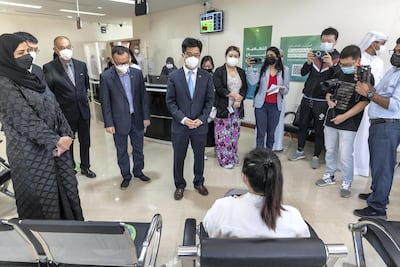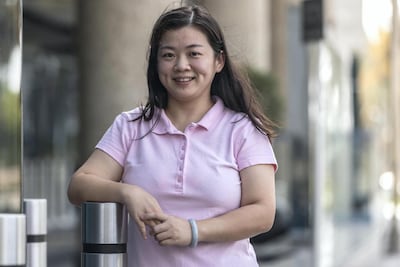Hundreds of Chinese citizens on visit visas to the UAE will receive their first dose of Covid-19 vaccine on Thursday.
About 200 have registered for the Sinopharm vaccine at the Safa healthcare centre in Dubai, with inoculations to be administered by the Dubai Health Authority.
Hend Al Ketbi, DHA’s director of nursing for primary healthcare centres, said there was available capacity to vaccinate more than the 200 who had signed up for the opening day of the campaign.
Chinese visitors are the first non-residents to be offered Covid-19 vaccines in the UAE after an agreement was confirmed on Sunday.
Chinese grandmothers carrying toddlers were among dozens to arrive early at the centre on Thursday morning.
Two doses of the Sinopharm vaccine will be provided to Chinese citizens over the age of 16 who are without a residency visa and hold a short-term visa.
'We feel safe'
Yang Chongqi, 61, from Beijing, beamed as she carried her year-old granddaughter into the vaccination room.
Aladdin Essam, her Egyptian son-in-law, said the vaccination was a protective shield for his family.
“You cannot imagine how safe we feel that even Chinese visitors can get the vaccine,” he said.
“This has always felt like a second home. You feel that in any emergency you will be taken care of.”
Ms Chongqi has been in Dubai for the past three months to take care of her grandchild.
I thought it was impossible
Yao Zhang, 30, never thought she would be granted the opportunity to be vaccinated while abroad.
“When holding a visit visa, it’s impossible to get a vaccine in any country. I feel extra happy and proud,” she said.
An office manager in the hospitality sector, Ms Zhang came to Dubai in January with her husband looking for opportunities after being laid off in the US.
A resident of Guangxi in southern China, Ms Zhang said she hoped to go home but it was tough to get a ticket.
She has completed online hospitality training while waiting for a job or a flight home.
“Like this vaccine, there is always hope. I believe there will be opportunities. There is always light at the end of the tunnel,” she said.
A show of solidarity

Li Xuhang, China’s consul general in Dubai, said the inoculation drive highlighted the "solidarity between the UAE government, Dubai and the Chinese government”.
“Our aim is to protect overseas Chinese nationals with the support of Dubai,” he said as he visited Chinese citizens receiving the vaccine.
“We highly appreciate the support of UAE and Chinese nationals feel the friendship here.”
The consul general spoke to a group of Chinese tourists waiting for 20 minutes after their vaccination.
“The vaccine is the only way to make people healthy and safe,” he said.
Chinese officials from the consulate were present to assist with translation when people checked in to register for vaccines at the centre.
'We've been waiting for this'
Alice Zhang was among among the first to be vaccinated.
"I'm very excited. I will feel safer," Ms Zhang, 31, told The National before receiving the vaccine.
“I have been waiting for this and hoping to see this process start. Now it is my turn and I feel happy.”
Ms Zhang received a card showing her second dose in three weeks and would not need to register for the next shot.
She arrived in Dubai in November and decided to remain after her flight home was cancelled last year.
Many Chinese citizens on temporary visas extended their stay in the Emirates because of a lack of flights home.

China drastically restricted international flights last year owing to the coronavirus pandemic.
Few flights currently operate from the UAE, driving up the price for a one-way ticket to Shanghai to more than Dh20,000 ($5,445).
Ms Zhang is from Wuhan, where the first Covid-19 cases were reported, and said she followed a strict regime to stay safe during her stay in Dubai.
Some friends on tourist and residency visas in the Emirates tested positive for the disease over the past year and, although they recovered after mild infections, she felt anxious about contracting the illness.
“I was worried throughout because, if I was in China, I could have got the vaccines easily. Wuhan was the first city for the vaccines," she said.
“In Wuhan we have learnt a lot. We were taught by the government to protect ourselves. I wear masks always, wash my hands and take Chinese traditional herb tablets.”
Chinese tourists are required to enter their passport details, Chinese identity card number and their UAE address to register with the consulate or embassy to receive the Sinopharm vaccine.
'Proud' to support Covid-19 fight

Beijing resident Wang Lu Lin, 33, registered for the vaccine and is awaiting an appointment.
She said she was "very proud" to receive the vaccine overseas.
“Thank you homeland," she said.
Ms Wang has been in Dubai since January and is enrolled in English language courses.
She lives with a friend in International City and has been carefully restricting her travel.
Ms Wang, a former journalist, hopes to find a job in Dubai while she improves her language skills.
Many Chinese citizens on temporary visas have taken up study courses and are looking for jobs.
Ms Zhang lives in a hotel apartment in Dubai’s Silicon Oasis and completed a master’s degree online. She is researching options to start a business.
"I came to Dubai looking for business opportunities, but after my flight was cancelled I'm spending time doing research on general trading, real estate and tourism," she said.
“My plan is that I will find a job or find a partner to start a company. I’m hoping to start a business in tourism or real estate.”
Ms Zhang uses her experience in translation and administration to complete online projects for companies.
“The medical system in Dubai is good so my family is not too worried that I am here. Even if I go to a hospital here there are Chinese doctors,” she said.
Strict quarantine rules to enter China deter travellers who worry about their ability to leave the country for work.
New quarantine regulations require all travellers into China to isolate for 14 days before their flight and take antibody and PCR tests before they fly.
Passengers must enter institutional quarantine for two weeks when they land in China.
Once a traveller reaches their final destination, some provinces require 14 to 21 days quarantine in a government centre, hotel or at home.
Emirates and Etihad said they have no flights to China for the next few months.
Flights were suspended based on travel restrictions and government approval, according to information from call centres of both airlines.
Air China showed one weekly flight available to Beijing.










